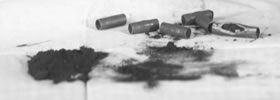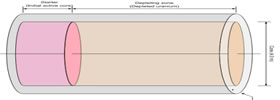
Modified Open Fuel Cycle
The key differences between a Open-Through Fuel Cycle and Modified Open Fuel Cycle are sublte but important.
The Once Through Fuel Cycle has the following characteristics:
- No recycling or conditioning of used fuel
- Low uranium utilization
- Appropriate for a low price uranium future
- Appropriate when repository capacity and/or actinide loadings are not show stoppers.
Briding The Gap

Modified Open Fuel Cycles can provide benefits of both Open and Full Recycle fuel cycles. Modified open cycles involve reusing fuel. This will require some form of treatment to the fuel, cladding, etc. For proliferation purposes however, the focus of the term "treatment" means to modify the used fuel in some way.
Example Concepts

Key elements of the Modified Open Fuel Cycle include
- Breed and burn recycle reactor concepts (including the traveling wave designs)
- Deep burn of recycled transuranics in high-temperature gas reactors (requires fuel processing)
- Deep burn of recycled transuranics in inert matrix fuels
Research Projects

Modified open cycles can be made possible by designing a system that utilizes new a novel concepts currently being analyzed by SNRI. Additionally, SNRI will need to further develop fuel forms that accomodate much higher exposure and develop conditioning processes that avoid complex chemical operations. SNRI is looking to complete all R&D work in the next 8 years.
>> Read MoreInspection & X-Rays

The current use of manual inspection by fuel vendors for quality control of the fabricated fuel pellets is not only-time consuming but also exposes the inspection staff to limited radiation. SNRI is developing an automated, real-time fuel rod inspection technique for better speed and accuracy using an X-Ray tomographic inspection technique to detect anomolies.
>> Read Morecontact us
Have questions? Need information? Looking for employment? SNRI is constantly seeking to engage with driven, innovative, and team oriented researchers, analysts, engineers. Contact us about potential research projects and joint opportunities!